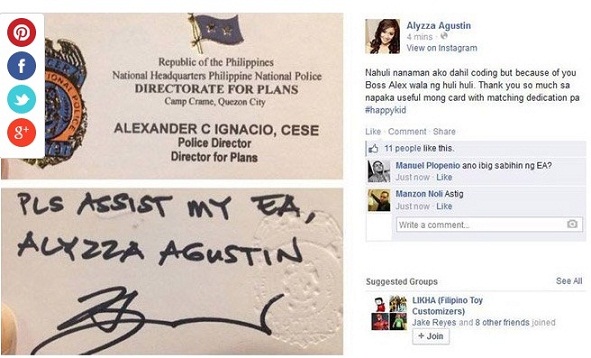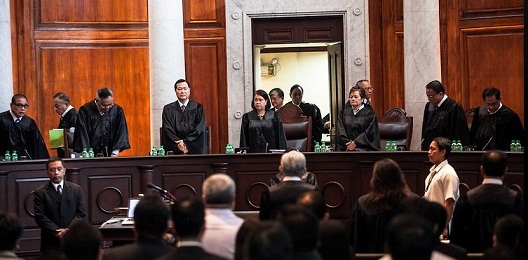Malevolent forces are busy at work in Facebook.
I was informed by my niece yesterday about a fake “Ellen Tordesillas” Facebook account.
I checked it out and there it was: just my name. No photo, no post.
Malevolent forces are busy at work in Facebook.
I was informed by my niece yesterday about a fake “Ellen Tordesillas” Facebook account.
I checked it out and there it was: just my name. No photo, no post.

The incident involving car model Alyzza Agustin and Police Chief Superintendent Alexander Ignacio is one example of something good coming out of a stupid act.
God works in mysterious ways indeed.
Last Sept. 28, Agustin, who apparently enjoys social media but does not comprehend it’s power and perils proudly posted in her Facebook and Instagram accounts that she was able to get away violating the number coding traffic scheme in Metro Manila by using a calling card Ignacio gave her.
She bragged: “Nahuli na naman ako dahil coding but because of you Boss Alex wala ng huli-huli. Thank you so much sa napaka-useful mong card with matching dedication pa.”

We did not fully get what we asked Supreme Court regarding the Republic Act 10175 otherwise known as the Cybercrime Prevention Act of 2012 which was to declare the whole of it as unconstitutional primarily because of its libel provisions. But we can live with the Supreme Court decision released yesterday.
We still have to fully analyze the SC decision which upheld the constitutionality of the controversial law but struck down the most odious “take down”provision which empowered the Department of Justice) to restrict or block access to any online post which it deemed violating the law without any court order.
The court also said only original authors of libelous material are covered by the cybercrime law, and not those who merely received or reacted to it. So those who “liked” and shared a libelous online item won’t be punished. Good luck to whoever is tasked to trace the original author after a post is shared and reposted thousands of times.
We remember again Neonate with this letter from his daughter, Grace. Dear Ellen, It has been months since I visited my father’s blog, Winks and…
Stirring journalism and security worlds are WikiLeaks releases of classified military documents on the war in Afghanistan filched by a 22-year old American intelligence analyst from State department online files.
The leaked documents are unprecedented in terms of volume – 91,000 diplomatic cables out of the 260,000 that Bradley Manning, the intelligence analyst, said he downloaded covering the years from 2004 to 2010. The leaks underscored the game-changing role of the internet in information dissemination.
The leaks, which have been condemned by the White House, Pentagon and State Department, raises anew the endless debate on press freedom and the public’s right to know versus national security.
There is also the aspect of humaneness , of not putting innocent people at in harm’s way, that every journalist should value.
If you click to www.op.gov.ph, the website of the Office of the President, it will direct you to www.gov.ph,the official website of the Philippine government.…
Update: electricity resumed in our place first hour of July 16 (Friday). With that water supply also resumed. A welcome relief. Internet connection not yet…
Update, July 10, 2010: Carandang resigns from ABS-CBN. ANC Management accepted the resignation of Anchor Ricky Carandang, which he submitted Friday, July 10, 2010,” the…
Wow, after three days of inaccessiblity, this blog is back. Same thing with VERA Files. Thanks for your patience.
I woke up this morning to find this blog suspended. Ploghost, my service provider, said there was Distributed Denial of Service (DDOS)attack. Napa-research pa tuloy…